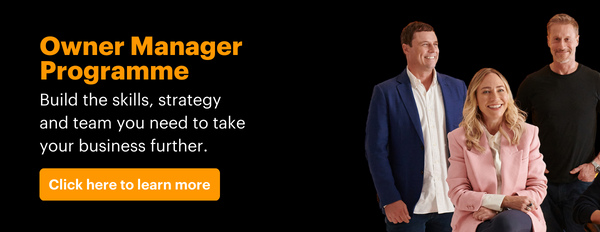The SME State of Play - Five Strategic Concerns & Solutions in 2024

Blocking out the noise around you, adopting a laser focus on your business and developing a goal-orientated positive mindset in uncertain times were among the themes explored in our first blog of 2024.
In this blog, we'll address five of the most common strategic concerns for SME owners cropping up in conversations with The Icehouse so far this year.

1 | Getting Clear On Your Strategy & Communicating It With Your Team
When times are tough and every cent counts, it’s important for business owners to get clarity on what makes them unique and why customers should be spending their precious cash with that business.
A clear strategy helps clarify purpose, defines USPs and prioritises immediate and mid-term goals and the business’s ultimate direction of travel.
Once the plan is clear, it’s vital to articulate the message to the team through regular communication. A 2017 PwC survey shows that 93% of employees don’t understand their company’s strategy.
Research shows that workers who aren’t in tune with the big picture lack motivation, get frustrated and disengage. When the team knows the mission and has it articulated regularly, they have a stronger connection to the business, understand their essential role, and are empowered to be better workers.
2 | Managing Expectations
Entrepreneurs and owners naturally carry the weight of expectation with them daily. They started the business with a vision to achieve x, y, and z, but everything becomes more complicated when the business isn’t making the anticipated progress.
Determining expectations early on is fine, but be prepared that these can’t be set in stone. Unquestionably, how the business looks today is unrecognisable from the business on day one, so expectations need to be fluid and can be re-set.
The owner also needs to give themselves time to recognise their enormous success so far, appreciate the skills already developed on the ownership journey, and respect that it’s okay to admit that they don’t know what they don’t know to create space to add more to their knowledge base.
3 | Sound Financial Decision-Making During Times Of Uncertainty
By making informed choices about investments, expenses, and financing, a business can enhance profitability, strengthen its financial position, and navigate economic challenges effectively. However, while 40% of SME owners consider themselves financially illiterate, 81% do the finances themselves (CPA Practice Advisor).
This is where additional training can be a genuine business asset, particularly in uncertain times. For example, a detailed understanding of cash flow forecasting and analysing operational performance can indicate where working capital and cash are consumed at high rates.
Unlike critical thinking or communication skills, which owners add to their toolbox organically as the years roll on, financial literacy cannot be picked up along the way with any degree of proficiency.
4 | Prioritising & Utilising What You Have Over What You Want
Making business decisions based on sensible and sustainable strategies begins by setting achievable, specific and attainable goals, which are continually reviewed. This can begin by assessing the value, importance and potential impact on business operations of current assets (including humans) and allocating resources efficiently.
Consider a risk assessment or SWOT analysis around whether what you have is good enough to sustain operations for a set period. What do the financials say about the right and affordable time for upgrades? And in which areas?
Asset depreciation, future business needs and market conditions can also play a significant part in the decision-making process. Moreover, it’s not the responsibility of one individual (in most cases, the owner) to prioritise assets. The process works more effectively through collaboration.
5 | Building Closer Partnerships
While many entrepreneurs and owners see themselves as an island, it’s impossible to do it all themselves. As they look back on their ownership journey, they’ll often realise they were more collaborative than they thought; the time they changed banks or accountants, found a supplier whose reduced rates helped them in the first days – the success of any organisation depends on the quality of its present and future partnerships.
Building and continuously maintaining positive relationships can be the difference between growth and stagnation and is a philosophy The Icehouse is passionate about.
By collaborating with partners who bring unique skill sets and knowledge to the table, businesses can enhance their capabilities, from access to new markets, shared expertise and knowledge, broadening the value proposition, co-creating solutions, and even expanding the product range. Partnering enables you to expand, develop and innovate. Furthermore, the benefits continue as you grow.
As a business owner, adopting these strategies can give you incremental gains, which, when put together, can make an enormous difference to the health of the business, putting you and your organisation in the best possible shape to explore opportunities as they present themselves.
For the latest news and information on The Icehouse, click here.





.png?width=50&name=Olivia%20Blaylock%20(2).png)